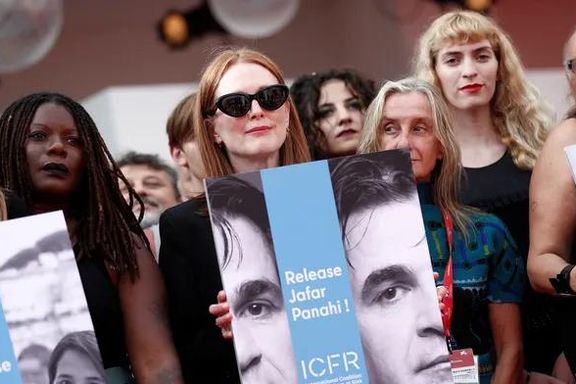Jailed Iranian Filmmaker Receives Venice Festival Award

The Venice Film Festival awarded its Special Jury Prize to jailed director Jafar Panahi after participants called for the release of jailed Iranian filmmakers.

The Venice Film Festival awarded its Special Jury Prize to jailed director Jafar Panahi after participants called for the release of jailed Iranian filmmakers.
Panahi, one of Iran’s most acclaimed directors, who is currently serving a six-year prison sentence from a decade ago, received the awardfor his latest film ‘No Bears’. During the screening of the film Friday an empty chair stood for Panahi.
Directors, actors and activists attending the festival led by jury head Julianne Moore and Audrey Diwan gathered on the red carpet Friday and held up placards with Panahi’s face and the the message: “Release Jafar Panahi!” ahead of the Venice world premiere of his film.
The festival also awarded the Orizzonti (Horizons) Award for Best Film to Iranian director Houman Seyedi for “World War III”, and Orizzonti Best Actor Award to its lead actor Mohsen Tanabandeh. “World War III” is a dark comedy which tells the story of making a film about the Holocaust in Iran.
Panahi, who has also won the Golden Leopard at Locarno Festival, the Golden Lion in Venice, and the Silver Bear at the Berlinale in the past, was first arrested in 2009 for participating in anti-government protests and twice in 2010 and sentenced by a Revolutionary Court to six years in prison and a 20-year work ban but the prison sentence was suspended. since then, he has made his films, including ‘This Is Not A Film’ in 2011, stealthily in defiance of the ban.
He was arrested again last month for protesting the July 8 arrest of two other renowned filmmakers, Mohammad Rasoulof, director of Berlin Golden Bear winner There Is No Evil (2020), and Mostafa Al-e Ahmad (Poosteh) at Tehran’s Evin prison.
Rasoulof and Al-e Ahmad were arrested as part of the Iranian crackdown on the signatories of a collective statement titled “Lay down the gun” issued by more than 100 film industry personalities in the end of May.
Renowned Iranian actress Leyla Hatami was a member of the jury of the Venice International film festival this year. Like other female Iranian artists who live and work in Iran, she appeared in a stylish long dress and headscarf. All female Iranian artists have to abide by the compulsory Islamic dress code (hijab), not only in Iran and in public, but also in films and at foreign film festivals.
Officials of Iran’s clerical government and hardline media often accuse dissident artists and filmmakers, particularly those whose works are awarded by foreign film festivals, of presenting a “dark image” of the Iranian society in their films.
Iran's minister of culture and Islamic guidance Mohammad-Mehdi Esmaili said recently that Iranian films cannot participate in foreign film festivals if they are not authorized to be shown in Iran. “The future of those who act against our national interests, speak against the Iranian people, and take advantage of the cruel sanctions against the Iranian people, is clear.”
Artists, filmmakers, and producers who promote the Islamic Republic’s values and policies, however, receive great support and funding from government organizations.